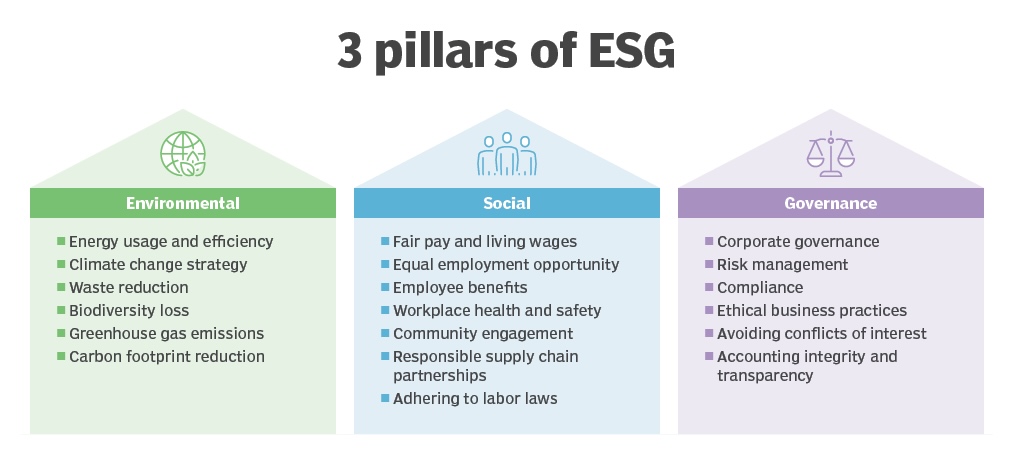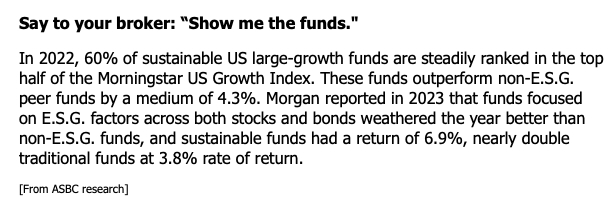
"Consumers can ensure that the companies they buy fit their values." [o]
“There are no passengers on spaceship earth. We are all crew.” — Marshall McLuhan
E.S.G. is environmental, social, and (corporate) governance — a set of practices and metrics used to evaluate a company beyond its financial performance.
WHITNEY SMITH I am intrigued by a question, which I hope can also help us understand this topic: What drives the movement to a sustainable economy? Is it government, businesses developing new technologies, investors, consumers, or organizers and advocates on the ground? What are your thoughts?
DAVID LEVINE It’s a combination of different stakeholders influencing the drive to the type of economy they want. Consumers are more consciously aligning their purchases and the companies they buy from to their values. This awareness applies to investors as well, who have a better understanding of the perilousness of climate and are therefore moving their money according to environmental, social and governance factors as a way to mitigate risk. Seeing the market opportunities, businesses have changed their policies to focus on these factors as well. Government usually follows the lead of others, but can also act as a major catalyst for change. The recent passing of Biden’s Inflation Reduction Act is an example, bringing billions of dollars into the sustainable economy. So it’s a balance of these four roles.
SMITH The recognition of the need for a transition toward sustainability has increased over the last number of decades, so we have not only a fossil fuel industry digging in its heels, but now on the offensive. How we can start to understand this?
LEVINE The agenda of this campaign by oil companies and other related businesses is to persuade politicians to pass legislation at the federal and state level, but also to mount communication campaigns that present ESG principles in negative terms and threaten and isolate the organizations and businesses that are making advances toward a new economy.
The state’s CFO is permitted to make investment decisions “based solely on pecuniary factors and disallow the consideration of any social, political or ideological interests.”
SMITH Can you give us an example?
LEVINE In 2021, the state of Texas enacted a law called Senate Bill 13 (SB13) that features two main components. It requires retirement funds from any directly or indirectly held securities of any financial company that “boycotts fossil fuels.” Second, SB13 requires companies of a certain size who are seeking state contracts (of a certain size) to certify that they do not boycott fossil fuels. The bill defines boycotting in very broad language; for instance, as “refusing to deal with, terminating business activities with, or otherwise taking any action that is intended to penalize or inflict economic harm on, or limit commercial relationships with a fossil fuel company." The Texas comptroller has released a list of 10 financial companies, 15 public-traded companies and more than 350 privately-managed funds that are accused of supporting the fossil fuel boycott in some manner. This means preventing companies, some very large, like Blackrock, from doing business with the state of Texas. These are not small little firms they are scaring away from investing into renewables and clean energy. In addition to Texas, lawmakers in other states introduced 46 similar bills related to ESG investment in 2023 with a number of those passing. Florida passed a law declaring the state’s CFO is permitted to make investment decisions “based solely on pecuniary factors and disallow the consideration of any social, political or ideological interests.” All this has an enormous impact on the ability to do business.
SMITH If we were to hear from an advocate of the anti-ESG movement, what are the arguments he or she would put forward?
LEVINE Interestingly, they say that incorporating criteria relating to good environmental, social and governance practices is restricting the free market. But it’s exactly the opposite. Yes, we need certain rules to guide behaviour in a society because of how it impacts others. But if you’re telling me that I cannot do X and Y, that I cannot do business with those who think things **you don't like, that I cannot hold values I want to hold, is that not restricting my free will in the marketplace? It is. At the same time, they’re pushing their values on others and asking that they adopt them, and in the case of the state of Texas, you are banned from participation if you do not adopt those values.
As we consider all this it’s important to acknowledge that these anti-ESG advocates have a vested interest in keeping things as they are, and operating with an economic paradigm that includes a dependence on fossil fuels, extraction and short term profit at all cost.
SMITH What is to be done about the impact of this lobbying?
LEVINE Since it is taking root in so many places, the work has to be done at multiple levels. While we cannot let the fossil fuel companies dominate how this story is communicated, our job is not to mount an **anti-anti-ESG, but to lift up the benefits of responsible business and investing. Investors should have the **freedom to invest. If we accept a free market and the ability for businesses and investors to do as they want — in the best interest of a business — why deter them from incorporating criteria that they believe is beneficial to their business and the economy overall? So part of this is how to lift up a new narrative, but doesn’t have us falling down the rabbit hole they want to toss us into, which is that pro-ESG policies are limiting to business. Actually, it is the opposite. They’re using legislation and this narrative to limit the ability of businesses and investors to move ahead economically because it doesn’t serve their quest for greater and greater financial gain.

SMITH Though we are focusing on the economics in this conversation, there are also the non-business arguments for ESG that affect this scenario.
LEVINE Exactly. Responsible business and investing is not only optional but essential for long-term financial success — particularly because of the impact of climate change. in 2023 the US experienced 128 separate climate disasters that cost at least billion dollars each in damages. Just considering the heat waves across the south, the wildfires in Hawaii and what crops and livestock were destroyed, what kind of the impact does that have on the economy and the ability of companies large and small to do business? So when a company is making business decisions, climate risk needs to be taken into consideration with everything else, and be transparent to investors. What information should investors have access to in order to make sound investment decisions? If access to that kind of information is curtailed by anti-ESG legislation, where does that put the investor who thinks he or she is playing with a full deck?
SMITH And one might ask, “What kind of a democracy is this — applied to commerce?”
LEVINE That’s one of several questions. Where is the company’s ability to exercise their “Freedom of Speech? How do we diffuse a chill that is discouraging businesses from speaking out? If an alternative energy company or an investment portfolio interested in solar energy is paralyzed by these pieces of legislation, or a pension fund feels pressed not to invest in new sustainable enterprises, businesses together need to stand up and say, “This is not okay.” This is where we step in, in lifting up a counter narrative which outlines the benefits of responsible business and the business and economic case for ESG.
SMITH And when you say ‘we’, you are speaking about your organization, the American Sustainable Business Council, and its organizational members collectively represent over 200,000 businesses. Tell us a bit about what you do.
LEVINE Since 2008, we’ve been building a business movement partnering with business organizations, companies, and investors to advocate for solutions in the market and public policy that support a more just and sustainable economy. After decades of progress we are now confronted with the anti-ESG movement. One, we need to support business leaders and investors to tell their story and explain the benefits of ESG to their business and the economy. Two, we need their voices in the media; and three, to have them speak about the beneficial case for responsible business utilizing ESG with decision-makers and legislators at the federal and state level. And additionally, to mount responses to counter the bad policies already implemented and to look at advancing good policy and good and fair administration.

An ice core still from Peggy Weil’s '88 Cores.' Photo by the artist. [o]
SMITH And how are these counter responses going?
LEVINE One of the successes is an amendment to the U.S. Department of Labor’s Employee Retirement Income Security Act (ERISA), an amendment that ensures that all factors are to be considered in the risk return analysis of potential investments. In other words, the analysts can take into consideration ESG criteria in assessing how to responsibly invest retirement income funds. So that’s good news, and the Biden administration helped to move that forward by supporting organizations that have been working on it for a long time. Another responsible policy development is in California where they enacted the California Climate Risk Disclosure Rules, which states that businesses are expected to announce and address climate-related financial risk. The understanding is that disclosure is important for investors, stakeholders, and the public so everyone has a clear sense and the financial impacts of climate change on those particular companies, and the companies themselves need to disclose what those impacts could be.
SMITH And the crux of this is a battle of arguments. You are making the case that utilization of ESG is good for business, investment and the general vigor of the economy and society, and they are making the case that it is bad.
LEVINE Yes, and that goes back to the core of why we started the American Sustainable Business Council in 2008. We looked around and I asked, “Why is there so little progress in making responsible, common sense decisions and policies?” Whether it was a transition away from fossil fuels causing climate change or the use of toxic chemicals in products that were poisoning families resulting in higher incidents of childhood cancer. Or raising the wages of people that are poorly paid, raising the minimum wage, providing paid leave or just workplace benefits. Go down the list of almost every issue. Wouldn’t it be better if children were healthy, if employees were treated well and earned enough to engage in the economy, or if we didn’t have to deal with the impact of all these climate disasters? Wouldn’t life be better and business and the economy better? The second question I asked is, “Who is shoring up the old model permitting toxics, low wages, minimal employee benefits, and climate denial?” — and you find that the U.S. Chamber of Commerce, the American Petroleum Institute, the American Chemistry Council and other trade associations are holding fast to this out-moded economic paradigm.
SMITH So when you started in 2008, when you approached business leaders and investors, what came back in response?
LEVINE We approached them with a question. “What if we bring together companies, investors, and business organizations that believe in a set of values and who have proved that they can run profitable businesses and make money off their investments as they also treat their workers well, protect and even regenerate the environment and solve other issues confronting our society. As time has passed we have seen a strong growth of businesses and investors recognizing these values as core to their mission and business practices.
Now we’re at a pivotal moment. We recognize the tremendous movement toward sustainability and environmental, social and governance factors. We support the Sustainable Development Goals that the U.N and other similar efforts. have been pushing forward. And We lift up these practices and policies worldwide.
This moment is ours: to move toward with these values and practices that will provide for a healthier, safer, communities and society and more robust and beneficial economy.

SMITH Though at times it seems daunting to change the course of bad policies such as this, but you have been through similar fights like this and not backed down.
LEVINE When hydraulic fracking came up in New York State we made the argument that there are more business opportunities and long-term jobs through the transition to clean and renewable energy than there are in the fossil fuel industry. Through a lot of hard work we with many other stakeholders were able to push forward to securet a ban on hydraulic fracking in New York State. The same arguments were made around pipelines when the Keystone pipeline from Canada into the US was being offered up as a solution. The U.S. Chamber of Commerce said it will kill the economy if you don’t move forward with it. The fossil fuel industry said it will kill jobs, but we made the argument that it is better to move now on the pathway to renewables — and there are good jobs there to be had as well.
Our sister organization the American Sustainable Business Institute received a U.S. Department of Agriculture Climate Smart Commodities grant to help transform the cattle and buffalo sectors toward more regenerative practises that would support the economy, create jobs, increase the value of the utilization of the whole animal but also have a climate impact in transitioning away from traditional agricultural practices, which have a heavy dependence on fossil fuels, petro-chemicals.
The principle is, put the intention forward, invest in new technologies, business will rise to the task, and the jobs will be there, and the economy can be robust without the negative impacts of passing on these externalities, and therefore without the impact of climate change.
SMITH These initiatives are powerful yet come from massive collective efforts. The individual reading this might wonder what he or she can do.
LEVINE There are the obvious ones related to civic participation: voting, being aware of and speaking up about public policies, directing your energies to some sort of political engagement locally and regionally — making your voice heard. As a consumer, choosing what products to buy and not buy, and ensuring the companies you buy from are aligned with your values. Choosing the company or organization you work for, and trying to influence the kinds of products they produce and the policies they hold and how they engage in society as a responsible business. If you have money to invest, think about where you are investing those dollars. ≈ç

A part of the central mural in the Climate Museum in New York, by R. Gregory Christie. Photo by Tess Abbot. [o]

DAVID LEVINE is the co-founder and president of the American Sustainable Business Network. He has worked as a social entrepreneur for over 30 years focusing on the development of whole systems solutions for a more sustainable society through building strategic partnerships and broad stakeholders initiatives. Previously, he was the founding director of Continuing Education & Public Programs at The Graduate Center, City University of New York, and from 1984-1997, founder and executive director of the Learning Alliance, an independent popular education organization. He lives in _______ {?}.
WHITNEY SMITH has been the Publisher and Editor of The Journal of Wild Culture since 1986. In the 1990s he founded Our Local Economy, a Toronto organization that organized conferences and public awareness events on Community Economic Development (CED) and similar grass roots economic resilience strategies. He lives in Toronto.

Add new comment